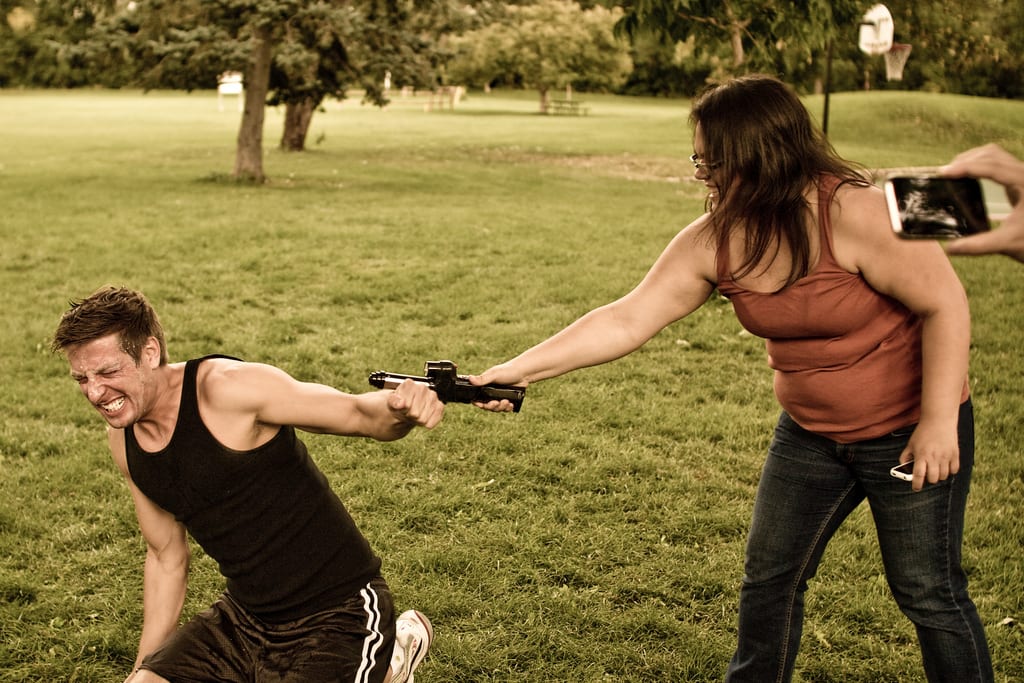- Home
- THE FIRM+
- Criminal Defense+
- CASE RESULTS
- AREAS WE SERVE+
- FAQ’s
- Blog
- Contact
AZHARI LLC BLOG

Posted By: Sami Azhari
Category:
Every citizen of the United States has the right to protect themselves against force or violence. That right not only applies to defending yourself, but also others – and in some cases, property as well.
However, it’s important to know exactly what your state law says about the level of force you are entitled to use and in which scenarios. Otherwise, you may end up discussing ways to defend yourself against assault charges.
In this post, we’re going to offer up a few rules of thumb when it comes to walking the thin line between self-defense and assault here in Illinois. After reading, if you still have questions about how your situation of self-defense resulted in assault charges, consult with a knowledgeable Chicago assault and battery attorney.
Imminent Threat
When presenting your case, you must be able to show that actions that could otherwise be seen as criminal were actually in response to an immediate threat. The threat can be verbal – as long as it has caused an immediate fear of physical harm in the victim.
The Thin Line: Once the imminent threat has ended, your actions are no longer deemed to be in self-defense, legally speaking. For example, say an aggressor assaults a victim, then ends the assault and indicates there is no longer any threat of violence. If the victim uses force against the assailant at this point, it is considered a retaliatory action, not self-defense, and could constitute a crime.
Reasonable Fear
In order for an assault to be considered self-defense, it must be found that a “reasonable person” in the same situation would have perceived an immediate threat of physical harm.
The Thin Line: If someone uses force in self-defense because the perceived threat caused genuine fear of imminent physical harm, but objectively this was an unreasonable response, it’s known as an imperfect self-defense. This doesn’t completely excuse the criminal act, but does lessen charges.
The Other Thin Line: When a person claiming self-defense is found to have provoked the attack, it is also considered an imperfect self-defense.
Proportional Response
The use of force in self-defense must match the level of threat in question. In other words, you can only be as forceful as it takes to remove the threat. Deadly force is usually only allowed when the threat itself also involves deadly force.
The Thin Line: A person can use deadly force only in the following situations:
- Defense of Person – A person reasonably believes it is necessary to prevent imminent death or great bodily harm (to him/her or another) or to prevent a forcible felony from being committed.
- Defense of Dwelling – Unlawful entry is made in a violent, riotous, or tumultuous manner and there is reasonable belief that force is necessary to prevent an assault/personal violence against him/her, or another in the dwelling, or to prevent a forcible felony from being committed.
- Defense of Property – A person is preventing or terminating trespass on or other tortious or criminal interference with either real property (other than a dwelling) or personal property, lawfully in his possession or in the possession of another household member, or he has a legal duty to protect it and reasonably believes such force is necessary to prevent a forcible felony from being committed.
Castle Doctrine
You’ve likely heard the analogy that your home is your castle. Well, the intent of Illinois’ castle doctrine laws is that, as “king” or “queen” of your castle, you should not be required to retreat from people who have no right to be in your home.
The Thin Line: A person can often use deadly force against someone who unlawfully enters their home, but exact judgements vary according to specific facts surrounding the case. For instance, Illinois law does not specifically address whether locations outside of someone’s physical dwelling – a front porch, connecting deck, the yard, or one’s vehicle – are protected under the doctrine.
No matter the circumstances, if you have been accused of a violent crime, you have the right to claim self-defense. However, while self-defense is universally accepted in principle, the concept leaves a lot of room for judgement, and you need professional legal representation as you walk the thin line between self-defense and assault.
Protect Your Rights – Consult with a Chicago Assault and Battery Attorney Today
Facing assault and battery charges can be daunting, but you don’t have to navigate the legal system alone. Our experienced Chicago assault and battery attorneys are here to help protect your rights and provide you with skilled legal representation.
Whether you’ve been wrongfully accused or you’re unsure about your legal options, our team can provide you with the guidance and support you need. We’ll work tirelessly to build a strong defense strategy tailored to your unique situation, ensuring that your side of the story is heard and fighting to achieve the best possible outcome for your case.
Don’t wait until it’s too late. Contact us today to schedule a consultation and take the first step towards defending your rights.
About the Author
Sami Azhari has been working as a lawyer since 2007, after receiving his Juris Doctor from the Michigan State University College of Law. He has handled numerous state and federal cases, and is known throughout the Chicago and Rolling Meadows area for providing his clients with high-quality, skilled representation. He has been recognized by SuperLawyers, the National Trial Lawyers Association, and other notable organizations, and has spoken at a number of legal conferences.


























































